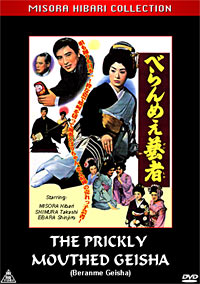

Back in the 1950’s and 1960’s Hibari Misora was perhaps Japan’s biggest entertainer with her presence in film, radio, TV and stage. In the USA during these same decades we had giant stars like Crosby, Astaire, Kaye and others who fit this bill - able to dance, sing, act and tell a joke and were loved by the country. For some reason these bigger than life entertainers have become an extinct species and now most celebrities are safely cocooned in their respective art and have little appeal on a broad level. Hibari began as a child star helping to boost the morale of Japan in the post WWII era and continued in show business until her death at 52 in 1989. Not a particularly beautiful woman, Hibari won the audience over with spunk, charm and talent – a great singer and an appealing actress. Off the stage her life was rather a lonely sad one – married for a short while to actor Akira Kobayashi (Black Tight Killers) - she spent most of her life alone, but she radiated when the lights were turned on. She once said "I always sang about love, but I don't know if I ever knew what it truly was". In some ways her life mirrored that of another child star, Judy Garland, who never really found happiness as an adult and both took a bit much to alcohol to ease the loneliness.
In this one Hibari Misora plays a modern day geisha who has a reputation among the clientele for not liking men very much and refusing to provide any of the “extras” they so want to get from the women in this profession. The viewer is introduced to the character when she stops three bullies from harassing a woman by smacking them and declaring to them “I am Koharu from Yanagibashi. Don’t take me lightly”. Forced into the profession because of the debts her father has piled up, she isn’t thrilled to spend her life entertaining trashy men.
Her father is a master carpenter but much too stubborn and surly to keep a job very long though she does her best to continuously find him one. One customer gives her a tip and she takes dad to interview for the job, but discovers that the President is her father’s old drinking buddy from years ago and the two immediately begin arguing over rank and status and nothing comes of it. But the President has an eligible son who needs a carpenter and he joins up with Koharu’s father to work on a project – and not at all surprisingly Koharu and Kenichi begin to fall in love – but of course his father objects to him marrying a geisha.
There isn’t too much to hang your hat on in this one but it provides a few small delights – playing pachinko for canned food goods, bowling and of course the songs that Hibari sings in every film it seems.
My rating for this film: 6.0